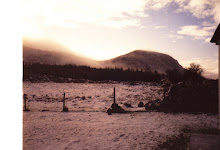David Moore on Funeral:
Ours is a generation overwhelmed by frustration, unrest, dread, and tragedy. Fear is wholly pervasive in American society, but we manage nonetheless to build our defenses in subtle ways-- we scoff at arbitrary, color-coded "threat" levels; we receive our information from comedians and laugh at politicians. Upon the turn of the 21st century, we have come to know our isolation well. Our self-imposed solitude renders us politically and spiritually inert, but rather than take steps to heal our emotional and existential wounds, we have chosen to revel in them. We consume the affected martyrdom of our purported idols and spit it back in mocking defiance. We forget that "emo" was once derived from emotion, and that in our buying and selling of personal pain, or the cynical approximation of it, we feel nothing.
Even in its darkest moments, Funeral exudes an empowering positivity. Slow-burning ballad "Crown of Love" is an expression of lovesick guilt that perpetually crescendos until the track unexpectedly explodes into a dance section, still soaked in the melodrama of weeping strings; the song's psychological despair gives way to a purely physical catharsis. The anthemic momentum of "Rebellion (Lies)" counterbalances Butler's plaintive appeal for survival at death's door, and there is liberation in his admittance of life's inevitable transience. "In the Backseat" explores a common phenomenon-- a love of backseat window-gazing, inextricably linked to an intense fear of driving-- that ultimately suggests a conclusive optimism through ongoing self-examination. "I've been learning to drive my whole life," Chassagne sings, as the album's acoustic majesty finally recedes and relinquishes.
So long as we're unable or unwilling to fully recognize the healing aspect of embracing honest emotion in popular music, we will always approach the sincerity of an album like Funeral from a clinical distance. Still, that it's so easy to embrace this album's operatic proclamation of love and redemption speaks to the scope of The Arcade Fire's vision. It's taken perhaps too long for us to reach this point where an album is at last capable of completely and successfully restoring the tainted phrase "emotional" to its true origin. Dissecting how we got here now seems unimportant. It's simply comforting to know that we finally have arrived.
And Stephen M. Deusner on Neon Bible:
Like many indie artists, the Arcade Fire work best in the album format, and Neon Bible runs on a different-- and in some ways more finely tuned-- mechanical system than its predecessor. It's a shapely work, gracefully building to fall away to build again, as the band sustains a mood that's both ominous and exhilarating. Even "No Cars Go", which originally appeared on their self-titled debut EP, sounds more powerful here than it did in its previous incarnation. As stand-alone tracks, these songs don't make as much sense, which partly explains why those early leaks were so uninspiring. The danger here is inaccessibility: There's only one natural entry point to Neon Bible, and it's "Black Mirror". Everything afterwards flows seamlessly from that song's low rumble and startling imagery-- until the final track.
Venturing into the lyrical realm of Trent Reznor, album closer "My Body Is a Cage" seems too eager to wallow in the sort of pained melodrama that fuels the band's detractors. The real disappointment is that Neon Bible doesn't end with "No Cars Go", which easily achieves the release they artfully promise but playfully deny throughout the record's first nine tracks. Not only would it have ended the album on a more generous note, it would have made perfect thematic sense as a final invitation to escape.

